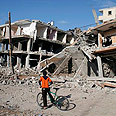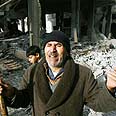

Ruins of a bombed building in Gaza
Photo: AP

Destruction in Gaza
Photo: AFP
"I saw a man enter a store with a bottle of olive oil in his hand and a set of glass cups. He asked the shop owner to trade them for a few boxes of canned goods. This site made me realize that our distress is far worse than we thought," Khan Younis resident Muhammad Abu-Dakka told Ynet.
Residents shuffling to relatives' homes in different areas of the Strip and seeking refuge in UNRWA schools in hopes of finding shelter from the daily Israeli bombings have left most homes in Abu-Dakka's Farahin neighborhood in Khan Younis abandoned.
War in South
Aviad Glickman
Attorney general says legal system preparing for wave of international lawsuits over Israeli offensive in Gaza; adds Judge Advocate General involved in every operational decision
Residents fled the area following shells on the nearby town of Huzaa – shells that left several dead and dozens injured. And yet, residents of the area feel that the worst is yet to come.
Abu-Dakka said that up until now his 70-year-old father has refused to leave his home, despite its proximity to the border fence with Israel and the IDF troops.
"Today, when the shells began sounding closer and the soldiers entered our territory; even my father realized there is no choice. Those that stayed here from a population of thousands have given up their lives and can even be counted on two hands. We've been set back dozens of year. It will take years upon years to rebuild all that was destroyed," Abu-Dakka said.
According to Abu-Dakka, who is now staying at his relatives' home in Khan Younis, UNRWA schools accept whoever they can, but after the shelling of the UN school in Jabaliya five days ago, many have stopped turning to the UN.
People are forced to ask for shelter with families they don't even know. "The sight of a hundred residents in an apartment is not a rare sight. Luckily, the residents understand the situation and the hosts are incredibly hospitable and patient. Without the help and the mutual support, things would be much worse.
"Schools mainly take in refugees, but they turned out to be no less dangerous. And at a time like this people still seek their comfort, and the schools don't have what can be found in houses. Even houses that host a hundred people have better conditions than those empty classrooms."
Abu-Dakka said the talk of the day among Farahin residents is Israel's alleged use of phosphorus bombs in the area. "They give out a horrible stench. People needed to be treated in hospitals because they also cause burns. As if we need more injuries from the war. I stepped on one of those myself and felt my whole leg on fire. Another man picked the bomb up and put it in his pocket to show his friends, and then felt his whole leg cooking."















